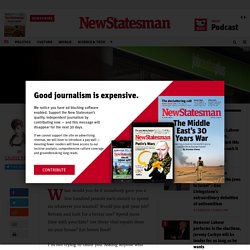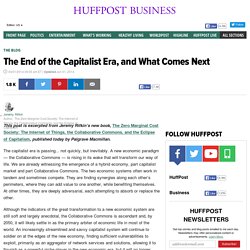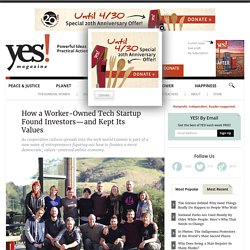

Sacred Economics with Charles Eisenstein - A Short Film. Rural Energy - Funding. Beetcoin - Slow Money. What Would Happen If We Just Gave People Money? Daniel Straub remembers the night he got hooked on basic income. He had invited Götz Werner, a billionaire owner of a German drugstore chain, to give an independent talk in Zurich, where Straub was working as a project manager for a think tank. He had read an article about the radical proposal to unconditionally guarantee citizens an income and spent a few years casually researching the idea. Straub had heard Werner was a good speaker on the topic, and that night in 2009 he was indeed excellent at connecting with the audience, a sold-out house of 200.
“It was a very intense evening; people were paying attention,” Straub recalled. Werner posed a pair of simple questions to the crowd: What do you really want to do with your life? Straub had studied business, international policy and psychology at school and spent years working for IBM, the International Red Cross and a Montessori school. He’s right that interest in basic income is spreading across the world. What would society look like with universal basic income? What would you do if somebody gave you a few hundred pounds each month to spend on whatever you wanted?

Would you quit your job? Retrain and look for a better one? Spend more time with your kids? Get those vital repairs done on your house? Eat better food? I’m not trying to taunt you. Basic income – the proposal to give a flat, non-means-tested payment to every citizen – is an old idea. Campaigns to get the idea taken seriously are sprouting like mushrooms around the world. “Basic income is about power, about letting it go,” Michael Bohmeyer, a former entrepreneur who runs Mein Grundeinkommen, told me. The End of the Capitalist Era, and What Comes Next The capitalist era is passing... not quickly, but inevitably.

A new economic paradigm — the Collaborative Commons — is rising in its wake that will transform our way of life. We are already witnessing the emergence of a hybrid economy, part capitalist market and part Collaborative Commons. The two economic systems often work in tandem and sometimes compete. They are finding synergies along each other’s perimeters, where they can add value to one another, while benefiting themselves. At other times, they are deeply adversarial, each attempting to absorb or replace the other. Although the indicators of the great transformation to a new economic system are still soft and largely anecdotal, the Collaborative Commons is ascendant and, by 2050, it will likely settle in as the primary arbiter of economic life in most of the world. The Economics of Happiness - Local Futures.
COULD ICELAND LEAD THE WAY TO A MONEYLESS ECONOMY? Iceland could become the world’s first moneyless economy according to Irishman Colin Turner, founder of the Free World Charter (FWC), who has started a campaign to promote the idea of a resource based economy on the North Atlantic island.

Colin, who founded the FWC in 2011 and has already attracted almost 50,000 signatories from over 200 nations, believes that the self-sufficient nature of the Icelandic economy would make it a perfect candidate for a radical shift away from traditional capitalism. The campaign is already garnering support from prominent Icelandic individuals and organisations as Colin explained: “So why Iceland? It’s an island that could easily become fully self-sufficient in terms of energy and food. There’s also a high degree of political and economic awareness and debate especially after events in recent years that have affected the global economy.”
“It’s not just about money of course. Duncan McCann: Community currencies is the real answer to Scotland’s currency conundrum. Sacred Economics with Charles Eisenstein - A Short Film. Charles Eisenstein: Crafting A New Narrative. Trade alternatives: an introduction. How a Worker-Owned Tech Startup Found Investors—and Kept Its Values by Nathan Schneider. Perhaps you remember the scenes, during the Occupy movement in 2011, of hundreds or thousands of people making decisions together in parks and squares.

They used strange hand signals, unwritten rules, and a “people’s mic” that amplified speakers’ voices through repetition by the crowd. This ecstatic democracy was short-lived. At the movement’s epicenter in New York City, these general assemblies faded away after police cleared the encampment that November. But in Wellington, New Zealand, a group of activists from the local Occupy group gave their assemblies an afterlife in an app. Now, they face the challenge of making it succeed in an online economy that remains far from an Occupy-style utopia.
True to its democratic ideals, the company is a worker cooperative, owned by the people who develop the software. Loomio, as their creation is called, has already enabled thousands of groups to deliberate, debate, and make decisions online. Loomio’s values have won it a devoted user base.